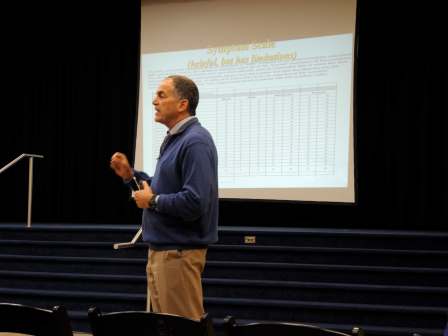Local
What parents, coaches, and student athletes need to know about brain concussions
9/16/2014

When Dr. Joseph A. Congeni from Akron Children's Hospital spoke with us earlier this week on the topic of Youth Sports Brain Injuries, he filled us in on the kinds of things parents, coaches, and student athletes need to know about brain injuries related to sports.
First, concussions often are caused by the head and neck snapping back and forth in a whiplash motion--not necessarily from a head-on helmet-to-helmet crash. Second, no two concussions are alike. Symptoms are numerous, diverse, and can be misleading.
They include, but are not limited to blurry vision, vertigo, decreased reaction time, headaches, and nausea.
Making matters even more confusing, there are no real conclusive, objective tests to determine whether or not you have a concussion--which makes it very hard to diagnose--even for experienced medical professionals--let alone part-time, volunteer coaches who are usually the first to be called in to evaluate a head injury during a game.
But the good news is, there are some better diagnostic tools available now than there were even a few years ago, and some game rules have changed that make concussions a little less likely.
However, the bottom line is that concussions are an extremely frequent injury related to sports, and the fastest growing category of kids who sustain such injuries is girls who play soccer and basketball.
Many, many times, kids who are injured continue to play, because they have either not been diagnosed properly, or because they are so eager to continue playing, that they hide their symptoms from parents and coaches.
Best advice: stay vigilant, and get informed.
Here are some other facts to keep in mind. (Source, Akron Children's Hospital)
1) Research shows that the developing brains of adolescents (ages 11-21) are more vulnerable to concussion than adults, and high school athletes take longer to recover than professional players.
2) Approximately 10% of athletes report concussion symptoms 30 days after the injury. About 5% have symptoms 3 months after injury, and 1% report symptoms 12 months later.
3) 20% of high school football players suffer head injuries in any given season.
4) Rest, physical and mental, is the key to recovery after a concussion.
Want to know more? Follow this link: https://www.akronchildrens.org/cms/sports_medicine_concussion_clinic/

The Lippman School
|
750 White Pond Drive
|
Akron, OH 44320
|
Phone: 330.836.0419
|
Fax: 330.869.2514




